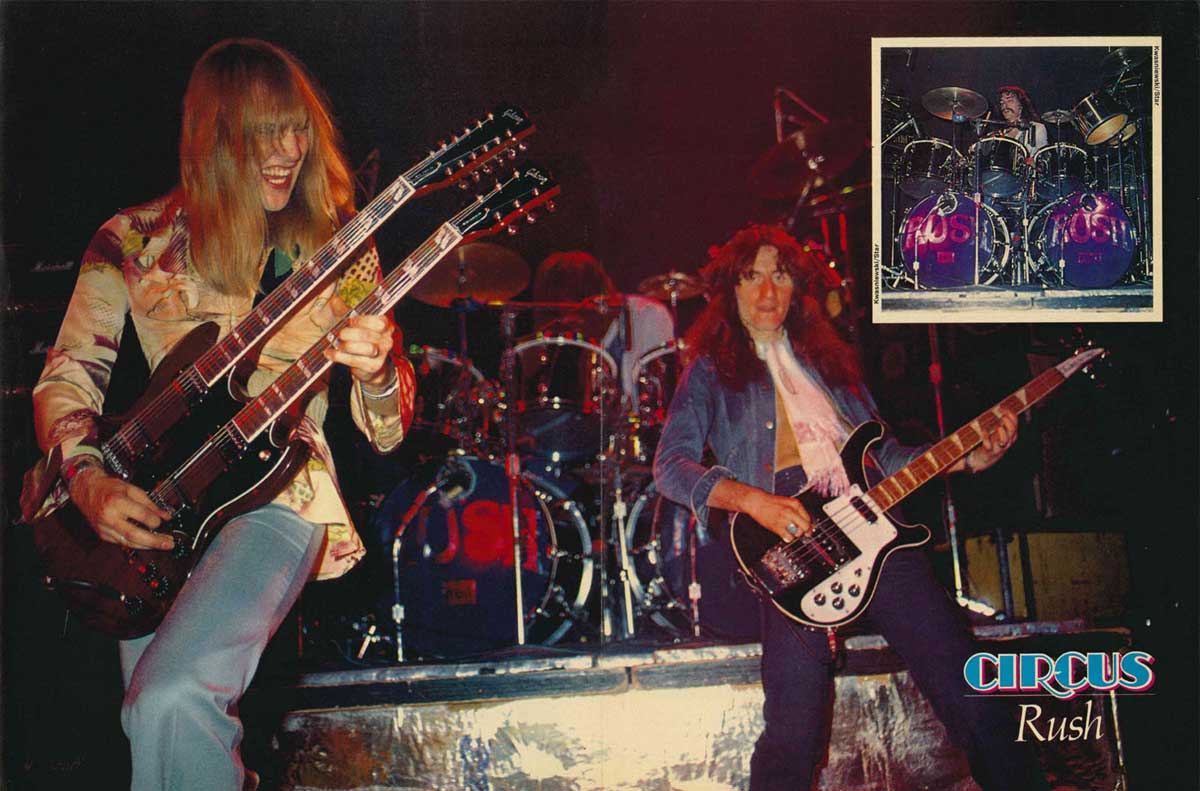Recognition is Only Half the Fun
Rush Audiences Grow Quickly as Critics Slowly Catch On
By Max Thaler, Circus, January 5, 1978, transcribed by pwrwindows

"Rush are something of a classic North American rock band. They are young - in their early twenties - good looking, and dedicated to producing concert rock of the highest calibre, involving a sophisticated light show, extended arrangements, epic lyric writing, and the kind of musical attack that gets audiences rocking out of their seats.
"When they toured Britain recently, they surprised a lot of people by selling out and getting a standing ovation at their gigs - not bad for a band virtually unknown here until recently."
Not band for a band that had no critical respect for about four long years, despite ever-enlargening audiences and record-buying support. The kind, quoted words above, written by English Melody Maker's excellent correspondent Chris Welch, tell a long tale, one that Neil Peart, Geddy Lee and Alex Lifeson are tiring of. But they will ultimately have the last laugh.
Simply, Rush has never been appreciated by the critics, and none of their albums qualify as "critic's choices." Their concerts are likewise either misconstrued, ignored or often misjudged by most critics, despite public reactions to the contrary. One New Musical Express headline ran as follows: "The Rush Phenomenon - This band has fans. Lots of them. They sold out the Free Trade Hall and surprised even the promotors." Obviously they didn't surprise the fans - enough of them, anyway, to sell the hall out.

Fortunately, stateside writers have been catching on, although the movement is still on the mostly local, groundswell level. Meaning, local newspapers, which are often closer to their readers' reactions than most of the "nationals," have been boosting Rush.
"Like a breath of fresh air in the misty haze of hard rock, there stands a relatively new phenomenon with an ever-expanding following that calls itself Rush. For the edification of those ignorant few who think that Rush is just something you get when you smoke..." begins Mike Derevlany's July 1977 review in The Good Times. Pete Bishop, in the Pittsburgh Press, following Rush's sixth successful gig in Pittsburgh, praises them for their best set ever.
"Rush Whips Up a Perfect Frenzy." "The Rush is Starting to Hit." "A Caress of Steel." "Rush: Hard Rock, Intelligent Lyrics." The headlines tell their stories; Rush is a crowd-pleaser, with or without the slow-to-react critical press.
Variety, that index of world entertainment, once summed it up: "It's an old story for rock groups in the 'heavy metal' or 'power rock' category. Traditionally, practitioners of this overly amplified sound, including Grand Funk Railroad, Aerosmith, Uriah Heep, Kiss, and others have met with nothing more friendly than a stone wall when it comes to the powers that control radio airplay." (This was after Rush had sold out a Chicago auditorium nine days before the gig.)
But Neil Peart's message, "Be Honest," does a better job of explaining their direct line to their fans. "Our music has to be an honest statement of what we want to hear and what we want to play. Honesty is the keynote, the principle which we try to apply to everything we do - the music, the business, our personal relationships with each other." And, luckily, Rush plays exactly the kind of hard-driving rock that backs them up pretty well.
Paul Rambali, in the NME, caught the critics/fans dichotomy cold: "Rush's ability in their chosen field is unquestionable. No matter how overworked their basic idea may be, they attack it with enough ferocious zest and almost obsessive dedication that the results really did sound alive and, to the crowd at least, fresh." You bet!